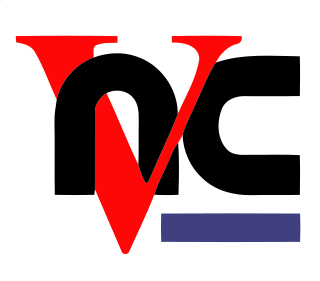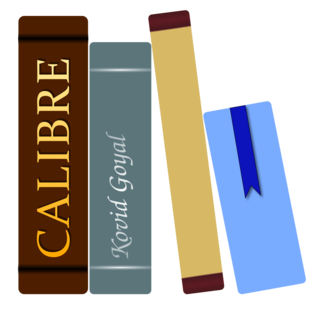Speech synthesis is the artificial production of human speech. A computer system used for this purpose is called a speech synthesizer, and can be implemented in software or hardware products. A text-to-speech (TTS) system converts normal language text into speech; other systems render symbolic linguistic representations like phonetic transcriptions into speech. The reverse process is speech recognition.
In HTML and XHTML, an image map is a list of coordinates relating to a specific image, created in order to hyperlink areas of the image to different destinations. For example, a map of the world may have each country hyperlinked to further information about that country. The intention of an image map is to provide an easy way of linking various parts of an image without dividing the image into separate image files.

Virtual Network Computing (VNC) is a graphical desktop-sharing system that uses the Remote Frame Buffer protocol (RFB) to remotely control another computer. It transmits the keyboard and mouse input from one computer to another, relaying the graphical-screen updates, over a network.

Computer accessibility refers to the accessibility of a computer system to all people, regardless of disability type or severity of impairment. The term accessibility is most often used in reference to specialized hardware or software, or a combination of both, designed to enable the use of a computer by a person with a disability or impairment.

A screen reader is a form of assistive technology (AT) that renders text and image content as speech or braille output. Screen readers are essential to people who are blind, and are useful to people who are visually impaired, illiterate, or have a learning disability. Screen readers are software applications that attempt to convey what people with normal eyesight see on a display to their users via non-visual means, like text-to-speech, sound icons, or a braille device. They do this by applying a wide variety of techniques that include, for example, interacting with dedicated accessibility APIs, using various operating system features, and employing hooking techniques.

Spencer Kimball is an American computer programmer, entrepreneur, and business executive. He is the CEO of Cockroach Labs, a company he co-founded in 2014. His work as a programmer includes creating GNU Image Manipulation Program (GIMP) while still in college, and assisting the source code development of CockroachDB, the namesake software of Cockroach Labs. In addition to Cockroach Labs, Kimball was involved in the founding of other tech startups including WeGo and Viewfinder.

Maxthon is a freeware web browser, created by JeffChen in Singapore. It is available for Windows, macOS, Linux, and as Maxthon Mobile for Android, iOS, and Windows Phone 8. Since version 6, Maxthon is based on Chromium.
JAWS is a computer screen reader program for Microsoft Windows that allows blind and visually impaired users to read the screen either with a text-to-speech output or by a refreshable Braille display. JAWS is produced by the Blind and Low Vision Group of Freedom Scientific.

The Social Science Research Network (SSRN) is a repository for preprints devoted to the rapid dissemination of scholarly research in the social sciences, humanities, life sciences, and health sciences, among others. Elsevier bought SSRN from Social Science Electronic Publishing Inc. in May 2016. It is not an electronic journal, but rather an eLibrary and search engine.

In computing, a news aggregator, also termed a feed aggregator, content aggregator, feed reader, news reader, or simply an aggregator, is client software or a web application that aggregates digital content such as online newspapers, blogs, podcasts, and video blogs (vlogs) in one location for easy viewing. The updates distributed may include journal tables of contents, podcasts, videos, and news items.

Google Reader is a discontinued RSS/Atom feed aggregator operated by Google. It was created in early 2005 by Google engineer Chris Wetherell and launched on October 7, 2005, through Google Labs. Google Reader grew in popularity to support a number of programs which used it as a platform for serving news and information to users. Google shut down Google Reader on July 1, 2013, citing declining use.

Software portability is a design objective for source code to be easily made to run on different platforms. An aid to portability is the generalized abstraction between the application logic and system interfaces. When software with the same functionality is produced for several computing platforms, portability is the key issue for development cost reduction.

NonVisual Desktop Access (NVDA) is a free and open-source, portable screen reader for Microsoft Windows. The project was started by Michael Curran in 2006.
A self-voicing application is an application that provides an aural interface without requiring a separate screen reader. Self-voicing applications can be an important form of assistive technology, useful to those who have difficulty reading or seeing.
OpenLearn is an educational website. It is the UK's Open University's contribution to the open educational resources (OER) project and the home of free, open learning from The Open University. The original project was part-funded by the William and Flora Hewlett Foundation. OpenLearn is a member of the OpenCourseWare Consortium (OCWC).

WindowLab is an X window manager for Unix-like systems. It is based on aewm and retains that window manager's lightweight aesthetic. In many aspects, WindowLab has looked to the Amiga's user interface for inspiration without cloning it completely. Its top-level menu bar is accessed by a right click as on the Amiga and it follows Fitts's law of usability in that once the mouse enters the menu area it is constrained there in both the horizontal and vertical directions. Unlike on the Amiga, the menu bar is not controlled by applications; it is a global launcher menu which is populated by a dot file in the user's home directory containing a list of menu titles and commands.

Calibre is a cross-platform free and open-source suite of e-book software. Calibre supports organizing existing e-books into virtual libraries, displaying, editing, creating and converting e-books, as well as syncing e-books with a variety of e-readers. Editing books is supported for EPUB and AZW3 formats. Books in other formats like MOBI must first be converted to those formats, if they are to be edited. Calibre also has a large collection of community contributed plugins.
Seadragon Software was a team within the Microsoft Live Labs. Its product, Seadragon, is a web optimized visualization technology that allows graphics and photos to be smoothly browsed, regardless of their size. Seadragon is the technology powering Microsoft's Silverlight, Pivot, Photosynth and the standalone cross-platform Seadragon application for iPhone and iPad.

Tata Research Development and Design Centre(TRDDC) is a software research centre in Pune, India, established by Tata Group's TCS in 1981. TRDDC undertakes research in Machine Learning, Software Engineering, Process Engineering and Systems Research.
Oswald Labs is a Dutch-Indian based accessibility technology company that builds products for individuals with disabilities. It specializes in enterprise web accessibility, offers smartphone apps, and also runs a startup accelerator. It was established in 2016 by Anand Chowdhary, Nishant Gadihoke and Mahendra Raghuwanshi after their product, Oswald Extension, won an event at the AngelHack hackathon in New Delhi.












